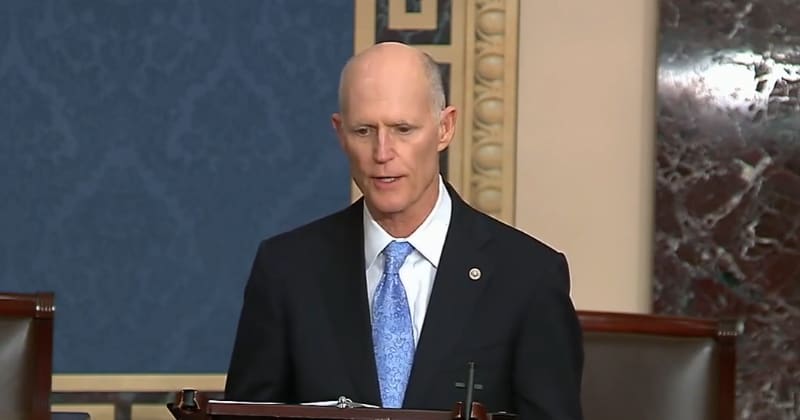This week, ahead of the Federal Open Market Committee (FOMC) meeting, U.S. Sen. Rick Scott, R-Fla., wrote a letter to Federal Reserve Chair Jerome Powell on the Fed’s “inadequate action and seeming inability to follow its own plan to shrink its balance sheet.”
Scott’s office took aim at the Federal Reserve’s policies.
“The Federal Reserve’s consistent failure to meet even the weakest of goals is infuriating for families across the nation who feel the effects of Washington’s dysfunction, and begs the question of whether the FOMC is actually committed to its word and working in the best interests of the American people,” Scott’s office insisted.
The letter is below.
Dear Chair Powell:
I have on many occasions spoken about the growing size of the Federal Reserve’s balance sheet and what I see as a lack of appropriate concern and response by the Federal Reserve to right-size it. Today, I write you once again to express my concerns and disappointment over the size of the Federal Reserve’s balance sheet and the Federal Reserve’s seeming inability to meet its own plans to shrink it.
In May 2022, the Federal Open Market Committee (FOMC) announced very modest goals and targets to begin reducing its holdings of Treasury securities as well as agency debt and mortgage-backed securities (MBS), as described in the Plans for Reducing the Size of the Federal Reserve’s Balance Sheet. Based on these plans, the Federal Reserve’s balance sheet should have fallen from around $8.9 trillion in June 2022 to $8.4 trillion today. That hasn’t happened. Today, the Federal Reserve balance sheet currently sits at $8.5 trillion, proof that the FOMC has completely failed to achieve its own very modest goals for balance sheet reduction.
As I have said, I believe your current plan to reduce the balance sheet is insufficient, and that it would never solve the problem of your massive balance sheet. I still do not understand why you cannot reduce the balance sheet at the same rate you have increased it. To now see that you’ve failed to meet even the weakest of goals is infuriating and begs the question of whether the FOMC is actually committed to its word and getting done what’s right for the American people.
With record inflation and rising federal debt and deficits, we must take further steps to combat the massive size of the Federal Reserve’s balance sheet. Therefore, I write to you today to ask the following questions:
1. Why is there a shortfall between your planned and actual balance sheet reductions since June 2022? Does the FOMC intend to meet its targeted caps for balance sheet reduction? If so, how?
Given these shortfalls, will the FOMC revisit or change its targets for balance sheet reduction?
2. Does the FOMC plan to discuss moving away from capped targets to a more active process for reducing the balance sheet?
3. Can the Federal Reserve be doing more to reduce its total balance sheet holdings? If so, how and when should they be done?
4. What is the appropriate size of the Federal Reserve balance sheet long-term, in your opinion? How should the FOMC reach this goal? Please provide a timeline or milestones for doing so.
I look forward to hearing from you on these important issues. I know you share my priority of keeping the American economy strong and sustainable, and I look forward to working with you as you continue to lead the Federal Reserve.








